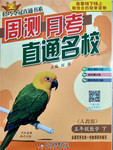题目内容
Do you want to be successful in everything you do? If so, then ? Here is an example.
There was a farmer who corn (玉米) all his life. Each year he took his corn to the market. Then each time his corn was chosen as the and won the first prize.
One year a newspaper reporter interviewed him and learned something about how he grew it. The farmer his seed(做种子的) corn to his neighbors.
"How can you share your best seed corn with your neighbors?" the reporter asked. "You know they are taking part in the with you each year. "
"Why, sir," said the farmer, "didn't you know? The picks up pollen {花粉)from the corn and moves it quickly from field to field. If nay neighbors grow corn, cross-pollination (异花传粉) will affect the quality of my corn. So if I want to grow good corn, f must my neighbors to grow good corn. "
The farmer knows much about the connection of life. His corn cannot improve his neighbor's corn improves.
As a great man says, "We make a living by what we ; we make a life by what we give." We can't without food, clothes, and many other things. However, a meaningf~I1 life is not decided by how much we can get, by how much we can give others. Giving, instead of taking, makes us from other animals. So those who choose to live well must help others to live well and those who choose to be happy must help others to find in their life.
There was a farmer who corn (玉米) all his life. Each year he took his corn to the market. Then each time his corn was chosen as the and won the first prize.
One year a newspaper reporter interviewed him and learned something about how he grew it. The farmer his seed(做种子的) corn to his neighbors.
"How can you share your best seed corn with your neighbors?" the reporter asked. "You know they are taking part in the with you each year. "
"Why, sir," said the farmer, "didn't you know? The picks up pollen {花粉)from the corn and moves it quickly from field to field. If nay neighbors grow corn, cross-pollination (异花传粉) will affect the quality of my corn. So if I want to grow good corn, f must my neighbors to grow good corn. "
The farmer knows much about the connection of life. His corn cannot improve his neighbor's corn improves.
As a great man says, "We make a living by what we ; we make a life by what we give." We can't without food, clothes, and many other things. However, a meaningf~I1 life is not decided by how much we can get, by how much we can give others. Giving, instead of taking, makes us from other animals. So those who choose to live well must help others to live well and those who choose to be happy must help others to find in their life.
| 小题1: |
|
| 小题2: |
|
| 小题3: |
|
| 小题4: |
|
| 小题5: |
|
| 小题6: |
|
| 小题7: |
|
| 小题8: |
|
| 小题9: |
|
| 小题10: |
|
| 小题11: |
|
| 小题12: |
|
| 小题13: |
|
| 小题14: |
|
| 小题15: |
|
小题1:B
小题2:A
小题3:C
小题4:D
小题5:C
小题6:D
小题7:A
小题8:B
小题9:C
小题10:A
小题11:D
小题12:D
小题13:B
小题14:A
小题15:D
试题分析:本文叙述了一位农民因为自己种的玉米而获得了一等奖,记者采访时发现他把最好的玉米种子分给他的邻居,这样他认为他能获得最好的种子。
小题1:考查疑问词及语境的理解。A. why为什么; B. how 怎样; C. when什么时候; D. where哪里。你想要在各个方面都成功吗?如果这样的话,那么应该怎样做呢?根据下文One year a newspaper reporter interviewed him and learned something about how he grew it.可知应该选B。
小题2:考查动词及语境的理解。A. grew成长; B. bought买; C. sold 卖; D, collected收集。根据he took his corn to the market.及he grew it可知这个农民种植玉米,故选A。
小题3:考查形容词及语境的理解。A. cheapest最便宜的; B. prettiest最漂亮的; C. best最好的; D. shortest最短的。根据won the first prize可知他的玉米被选为最好的,故选C。
小题4:考查形容词及语境的理解。A. popular受欢迎的; B, serious严重的; C. terrible 可怕的; D. surprising令人吃惊的。一年报社的记者采访了他,了解到他的令人吃惊的事情关于如何种植玉米的,根据下文How can you share your best seed corn with your neighbors?可知这件事令作者很吃惊,故选D。
小题5:考查动词及语境的理解。A, lent借; B. showed展示; C. offered提供; D. recommended推荐。offersth to sb提供给某人某物;根据下文How can you share your best seed corn with your neighbors可知这位农民把自己的种子提供给他的邻居,故选C。
小题6:考查名词及语境的理解。A. game游戏; B. fight 战争; C. experiment实验; D. competition比赛。与上文won the first prize农民获奖对应,指的是他人也会去参加比赛(competition)。故选D。
小题7:考查名词及语境的理解。A. wind风; B. water 水; C. farmer农民; D. neighbor邻居。根据moves it quickly from field to field这里指的是风(wind)会传播花粉。故选A。
小题8:考查形容词及语境的理解。A. tasty 美味的; B. bad坏的; C. tall高的; D. unusual不寻常的。农民担心不好(bad)的花粉会传播到自己的玉米上。故选B。
小题9:考查动词及语境的理解。A. teach 教; B. remind 提醒; C, help 帮助; D. require需要,要求。这里指的是农民帮助(help)邻居种植好的玉米。故选C。
小题10:考查连词及语境的理解。A. unless除非,如果不; B, though尽管; C. because 因为; D. when当……时候。如果邻居的玉米没有长进,他的玉米也不可能有长进。所以这里用unless“如果不”来表示。故选A。
小题11:考查动词及语境的理解。A. do做; B, own 拥有; C, get 得到; D. grow种植。这里与后面的give相对,get指的是“得到”,句意为“我们通过我们所得到的谋生。”故选D。
小题12:考查动词及语境的理解。A. cheer欢呼; B. move移动; C. work 工作; D. live生存。这里指的是“我们没有食物、衣服和很多其他东西,我们就不能生存”。故选D。
小题13:考查连词及语境的理解。A. and 和; B. but但是; C. or 或者; D. so因此。这里表示对前面的转折。故选B。
小题14:考查形容词及语境的理解。A. different不同的; B. free 免费的; C, safe安全的; D. far远的。这里说的是人与动物的区别。故选A。
小题15:考查名词及语境的理解。A. hope希望; B. success成功; C. friendship友谊; D. happiness高兴,幸福。根据句子前面的happy可知,因为在find的后面要跟名词,所以用happiness来表示。故选D。

练习册系列答案
 轻巧夺冠周测月考直通名校系列答案
轻巧夺冠周测月考直通名校系列答案
相关题目